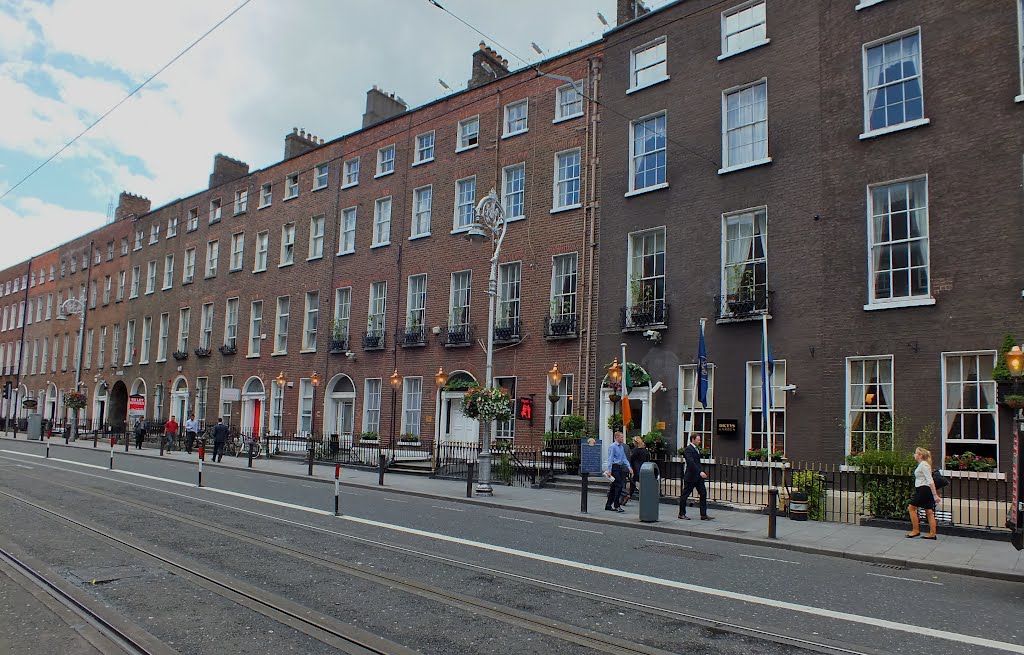
On 13th October at 10:45pm, I answered an accommodation advertisement I came across in a Facebook group for internationals in Dublin. My first scammer was named Andres Ann. The flat was at 51 Harcourt Street in the very heart of Dublin. The room was at €600 a month – all inclusive. Although it was over my budget, I wanted to schedule a viewing to get an idea what the market situation was. Andres Ann alleged that she was currently in the Philippines, which explained why she wanted to let out her flat so urgently. I would only receive the key to view the room after a deposit was paid. I therefore declined by saying it was too expensive anyway. She then asked me how much I was willing to pay and immediately agreed to my suggested price of €500 – which came across as rather peculiar.
On 22th October at 5:14pm, I wrote to Sophie Kroll. The room was available at a ridiculous €350, including all additional expenses. Plus it was located in Capel Street, just 10 minutes walk over Grattan Bridge to College. Again, the advertiser was abroad. The key would have to be shipped from London to Dublin after a contract had been agreed to and my deposit payment had been confirmed. Her Facebook profile was rather modest – no photos, no friends. It stated that Sophie Kroll was originally from Frankfurt am Main in Germany. Even though she was obviously struggling with her English, she funnily enough claimed to have grown up in Dublin. This whole situation appeared very odd, so I did not take it any further.
On 24th October at 12:41pm, I wrote to Indra Besing. The room with private bathroom was at €500, again all included. The pictures I received showed a light-flooded and nicely furnished flat with a great big fireplace. Once again, the landlord was not in Dublin but in Edinburgh for business. For the first time, I felt pushed and under pressure, as she pressed to proceed with contract and payment. I was unsure how to handle the situation. As I browsed through Facebook, I discovered that there were three Indras – all with the same face. According to my Facebook research, the real Indra Besing lived in Berlin, was married and worked in the film business as a production designer and actually existed, leading a real life.
My three scammers all liked the same football clubs (Bayern München and Chelsea) and had very few – never more than 30 – and very bizarre Facebook friends. None of them were available to schedule a meeting and all of them wanted a deposit, pre-paid. All of this, of course, provoked my suspicion. Was I a victim of organised crime? In the end it was my dad who brought me back to my senses. He suggested googling the issue, as he did not feel too comfortable with what I was describing. Dad and Google saved me the embarrassment of turning up at a doorstep demanding to view or move into a fictitious flat. According to the Independent, the Union of Students in Ireland (USI) spoke to an innocent woman who lived in the apartment that was advertised and she said that a number of students have turned up at her door expecting to move in after paying the scam artist a deposit.
Intimidation and disbelief remain though. I put off my room-hunt for a while – after all that I experienced, it is difficult to trust any kind of advertisement for accommodation anymore. In future I will turn to institutions like the International Student Accommodation or the Students’ Union (SU) rather than answering Facebook ads. Such institutions are well aware of this problem as Ian Mooney, SU welfare officer, confirms: “It is more common than people might think, as I have found out myself this year. It’s happened to students in other colleges around Dublin as well, with similar experiences – someone posting up the details of a home and asking for a month’s rent or a deposit up front.” According to Mooney, the SU will try to prevent this in future, by “educating students coming from abroad on how to avoid these scams while they are looking for accommodation.”
Back in my home country, it is common policy to view a place and meet the landlord before agreeing to a commitment such as renting a property. But as a foreigner I did not know how things were done here and even though my common sense was telling me to be careful, the need and pressure to find accommodation made me ignore the warning signs. “Unfortunately it seems that students from abroad are particularly vulnerable to this kind of scam. Reasons for it may include simply not being familiar with such scams in their native countries,” as Mooney states. “The absolute best tip to avoid this kind of situation is to always view a place and meet a landlord before paying any kind of deposit or signing any lease,” Mooney says and I agree, after all, renting a room is serious business. So, I guess, the moral of the story is to listen to your gut and never let yourself be pressured into something you are not convinced of. Be wary. Be vigilant. And finally – listen to your parents.






